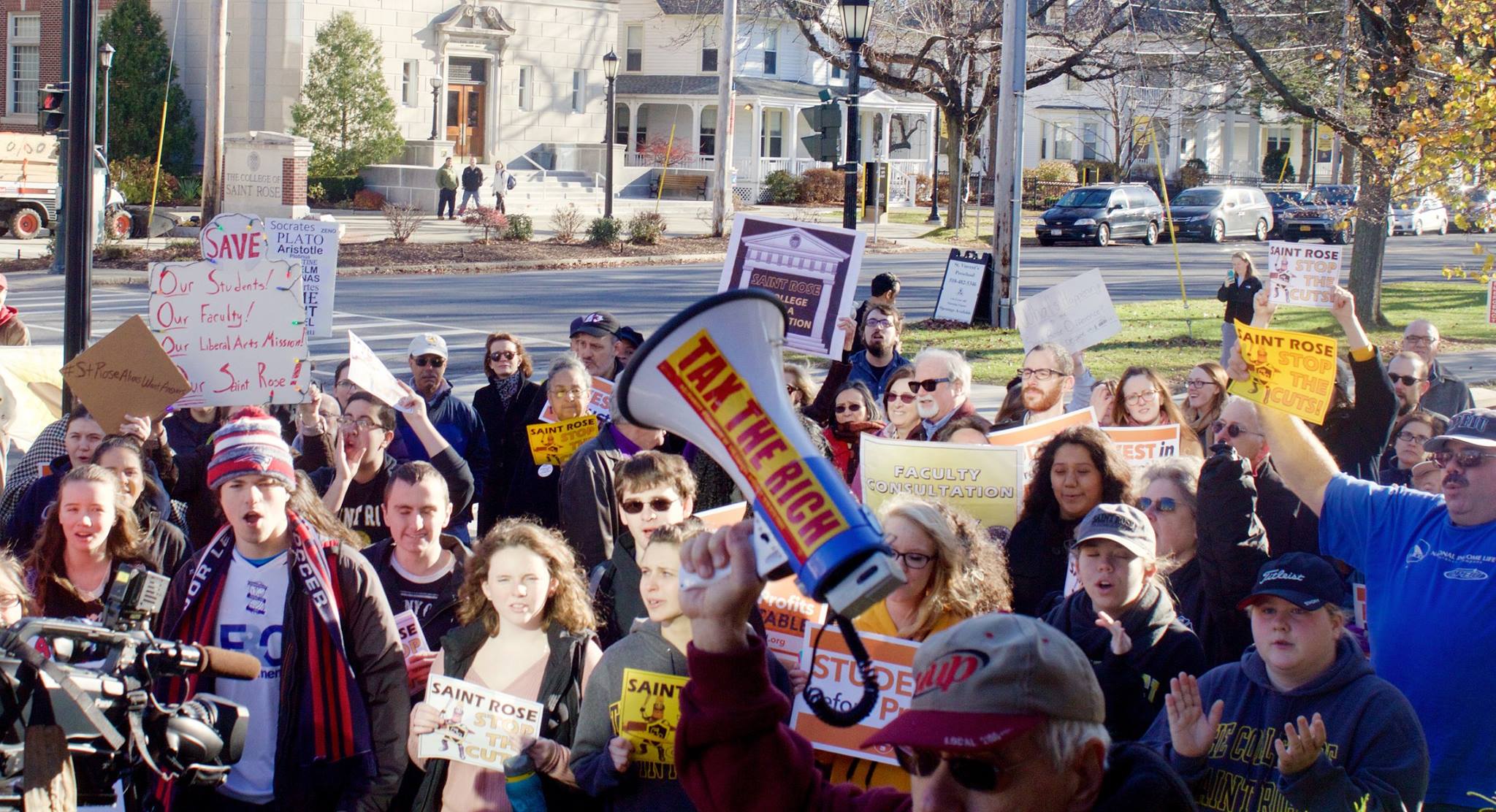By Vanessa Langdon
News Editor
The American Association of University Professors, or AAUP, has released a report on Wednesday, May 4, regarding their investigation of the academic freedom and tenure at the College of Saint Rose. The investigation comes after an announcement on Dec. 11 of the laying off of 27 academic programs and termination of 14 tenured and nine tenure-track faculty members as the result of an “academic program prioritization” process.
Since that announcement, the campus has been abuzz with uncertainty about the future.
The AAUP investigating committee visited the College of Saint Rose on Jan. 29 and 30 to meet with the involved parties. Prior to publication, the AAUP staff submitted the draft report of these findings to the AAUP Committee A on Academic Freedom and Tenure, which approved its further distribution and potential publication. The staff then sent the draft report to principal parties with an invitation for comment and corrections of fact.
At its next meeting, June 3 and 4, the AAUP Committee A on Academic Freedom and Tenure will determine whether to recommend that the Association censure the administration of the College. Censure can be imposed only by vote of delegates to the annual meeting, which occurs this year on June 18.
“As President of The Saint Rose chapter of AAUP, I want to express our members’ gratitude to the national organization’s leadership and staff for producing a report with so much exacting detail, thorough documentation of the facts, and compelling conclusions,” said Kathleen Crowley, a professor of psychology at Saint Rose.
“For more than 100 years, the AAUP has set the gold standard for defending and promoting academic freedom, which is rooted in the principles of shared governance and tenure—which they accurately conclude have been virtually eliminated by President Stefanco and the current Board of Trustees in a variety of ways, but most especially through unilateral mandates and the terminations of 23 tenured and tenure-track faculty,” she explained. “Even if budgetary cuts needed to be made, the process should have been done via true shared governance, while maintaining a respect for tenure.”
The AAUP report found that the College was in violation when it terminated both professors and programs. According to the report, in order to terminate the professors the College would have needed “a declaration of financial exigency or a demonstrably bona fide formal program discontinuance for educational reasons,” neither of which were present. One of those two items is required as stated in the joint 1940 Statement of Principles on Academic Freedom and Tenure and derivative procedural standards set forth in Regulation 4 of the Recommended Institutional Regulations on Academic Freedom and Tenure.
Additionally, the report found that the “‘academic prioritization’ process that led to the program cuts, moreover, was entirely inconsistent with relevant AAUP-recommended standards for program discontinuance set forth in Regulations 4d(1) through 4d(3) of the Recommended Institutional Regulations.”
According to the report, the decision of which programs to cut was also done without proper adherence to the shared governance agreement. The report goes on to detail two other instances where shared governance was not followed, “the unilateral implementation of a new transfer credit policy and the equally unilateral establishment of a restrictive e-mail policy.” The transfer credit policy was changed to allow students to bring in up to 90 credits, an increase from the original 62.
The report concludes by stating that the professors who were encouraged to participate in the decision-making process were not given enough time to shape informed recommendations and had restricted access to information.
“The program eliminations and faculty layoffs were ultimately the result of a lack of responsible stewardship at the board and presidential levels, leading to the faculty’s recent vote of no confidence,” states the AAUP in the report.
Lisa Thompson, chief of staff for the College, and Carolyn Stefanco, College president, did not respond to The Chronicle’s request for comment.
Crowley feels that this report is a step in the right direction.
“Tenure and the protections detailed in our Faculty Manual have now been rendered meaningless—the President now treats us as at-will employees, which is antithetical to academic freedom and undermines the ability of the faculty to guarantee students with the highest-quality education possible,” said Crowley.
“As such, a majority of the full-time faculty has signed union cards asking SEIU Local 200 United to represent us. Our AAUP/FASTR (Faculty Association of Saint Rose) chapter has informed Dr. Stefanco about our union and asked for her voluntary recognition of it, but she has declined to meet with us and union officials. We will continue our efforts to organize the faculty and to reestablish academic freedom, shared governance, and job security.”



Fantastic reporting, Vanessa. This is, once again, some of the finest reporting on this topic..